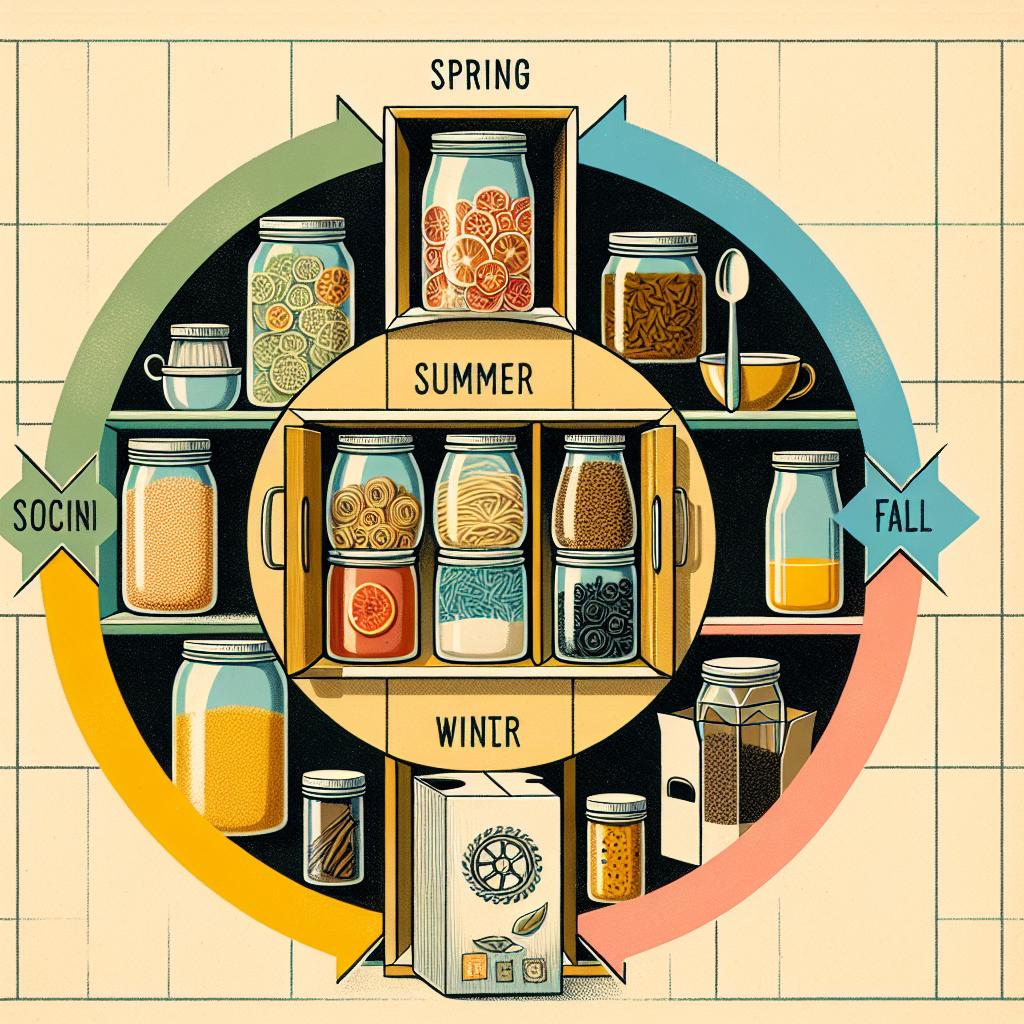Unlocking the Secrets of Efficient Cabinet Organization: A Guide to Serenity
In the hustle and bustle of daily life, cabinets often transform into chaotic repositories of forgotten items and mismatched containers. Yet, behind the closed doors of these storage spaces lies a realm of potential waiting to be unlocked. Imagine stepping into your kitchen or home office, greeted by neatly arranged shelves, where everyday essentials and cherished items coexist harmoniously. Organizing cabinets efficiently is not merely a chore; it is an art form that fosters both functionality and peace of mind. In this article, we will explore practical strategies, innovative techniques, and creative solutions that will help you reclaim your cabinets and enhance the way you navigate your space. Join us on a journey to transform the cluttered into the cohesive, turning your cabinets into a sanctuary of order and ease.
Maximizing Vertical Space for Optimal Storage Solutions
To fully utilize every inch of your cabinets, consider incorporating tall shelving units that make the most of vertical space. Vertical storage not only maximizes capacity but also provides easy access to all your items. Some effective strategies include:
- Stackable Bins: Use clear stackable bins to create layers of storage, allowing visibility while saving space.
- Adjustable Shelves: Invest in adjustable shelves that can be repositioned based on your changing needs, accommodating larger items as necessary.
- Hanging Hooks or Rods: Install hooks on the inside of cabinet doors for smaller items like kitchen utensils or cleaning supplies.
Additionally, utilizing storage baskets and drawer organizers can keep your cabinet’s contents tidy and easily accessible. This not only enhances the aesthetics but also improves functionality. For example, a simple layout can further streamline organization:
| Storage Option | Benefits |
|---|---|
| Lazy Susan | Rotates for easy access, ideal for corners. |
| Pull-out Drawers | Maximizes deep cabinet space, reducing clutter. |
| Tiered Organizers | Keeps items visible; great for spices or condiments. |
The Art of Categorizing: Creating Specific Zones in Your Cabinets
Creating distinct zones in your cabinets transforms chaotic spaces into organized havens. Start by assessing the items you frequently use and group them based on their purpose, ensuring easy access and efficiency in your daily routines. Consider categorizing your items into the following groups:
- Cooking essentials: Oils, spices, and utensils that you reach for while preparing meals.
- Baking supplies: Flour, sugar, and baking pans separated from everyday kitchen items.
- Snack zone: Chips, cookies, and nuts arranged for quick grab-and-go access.
In addition to grouping items, consider implementing specific containers or dividers that emphasize these zones. Not only do these tools enhance visibility, they also let you maximize the vertical space in your cabinets. Here’s a simple table showing some useful dividers and their benefits:
| Divider Type | Benefits |
|---|---|
| Stackable trays | Optimize vertical space, allowing for better categorization. |
| Drawer separators | Keep utensils and smaller items organized and easy to access. |
| Baskets | Add a decorative touch while grouping like items together. |

Smart Use of Containers and dividers to Enhance Accessibility
Utilizing containers and dividers within your cabinets can significantly improve accessibility and organization. By implementing stackable bins and labelled drawer inserts, you can create distinct zones for different categories of items. This not only reduces clutter but also enhances your ability to locate what you need without unnecessary rummaging. When arranging frequently used items on the top shelf, consider using containers that allow you to easily pull them forward, ensuring every piece is within reach.
Moreover, manually adjustable dividers can be a game-changer for cabinetry that houses utensils or tools. Rather than accepting the standard sizing, opt for customizable options that can adapt to varied item lengths. Some effective strategies include:
- Using clear containers for visibility and swift identification of contents
- Incorporating pull-out shelves to bring items closer
- Labeling bins with clear fonts for ease of access
This strategic organization not only promotes efficiency but also creates an aesthetically pleasing presentation that can be easily maintained.

Seasonal Rotation: Keeping Your Cabinets in Order Year-Round
To maintain organization throughout the year, consider implementing a seasonal rotation system for your cabinets. Start by dividing your items based on the seasons—this could be clothing, dishes, or even cleaning supplies. By setting aside your winter goods during the spring and summer, you create space to highlight seasonally pertinent items. Labeling bins or containers according to the seasons can also streamline the process, allowing you to effortlessly swap out your items. This not only declutters your space but also brings a fresh perspective to what you have on hand each season.
When rotating items, keep these tips in mind:
- Assess Every Item: Review what you use frequently and what you can live without.
- Prioritize Accessibility: Position seasonal items at the front for easy access.
- Group Similar Items: Sort by category to keep things organized—like with like.
| Season | Cabinet Focus | Key Items |
|---|---|---|
| Spring | Cleaning Supplies | Garden tools, spring decor |
| Summer | Outdoor Activities | BBQ tools, picnic supplies |
| Fall | Cozy Essentials | Blankets, autumn decor |
| Winter | Holiday Preparations | Gift wrapping, seasonal dishes |
Q&A
Q&A: Mastering the Art of Cabinet Organization
Q1: What are the primary benefits of organizing cabinets efficiently?
A1: Organizing cabinets efficiently can transform your space into a haven of order and productivity. Key benefits include saving time when searching for items, maximizing storage space, reducing clutter, and even enhancing visual appeal. An organized cabinet allows you to access what you need at a glance, making everyday tasks smoother and more enjoyable.
Q2: Where should I begin when tackling my cabinets?
A2: Start with a clear plan. Choose one cabinet to focus on and set aside dedicated time for the task. Empty the cabinet completely to assess its contents. This step not only gives you a fresh perspective but also allows you to identify duplicates and items that you might not use anymore.
Q3: How can I decide what to keep and what to toss?
A3: A good rule of thumb is the “One-Year Rule”: if you haven’t used an item in the past year, consider letting it go. Additionally, think about the condition of the items and their relevance to your current lifestyle. Items that are broken, outdated, or no longer serve a purpose can be disposed of or donated.
Q4: What storage solutions are best for maximizing cabinet space?
A4: There are several clever solutions worth exploring. Stackable containers can help utilize vertical space, while drawer organizers can keep smaller items neatly separated. Use clear bins for a quick visual inventory of what you have, and consider pull-out shelves or lazy Susans for easy access to the back of deep cabinets.
Q5: How do I ensure that my cabinets stay organized over time?
A5: Prevention is key! Develop a simple system for returning items to their designated places. Regularly schedule decluttering sessions—every season, for instance—to maintain the organization. Additionally, educate those who share the space about your organizational system, ensuring everyone contributes to the upkeep.
Q6: Are there any specific organizational techniques tailored to different types of cabinets?
A6: Absolutely! For kitchen cabinets, consider grouping similar items together, such as baking materials or cooking gadgets. In bathroom cabinets, use tiered organizers for easier visibility of products. For office cabinets, think about file organizers or labeled bins to keep papers and supplies sorted. Tailoring your approach to the contents will yield the best results.
Q7: Can technology assist in cabinet organization?
A7: Yes, indeed! There are numerous apps designed to help you catalog your belongings and manage inventories. Some allow you to scan barcodes or upload photos, making it easy to track what you have and share lists with family members. Alternatively, consider online solutions for shopping lists that prevent overstocking.
Q8: What if I feel overwhelmed by the amount of stuff in my cabinets?
A8: Take a deep breath! Break the process down into manageable chunks. Focus on one shelf or category at a time rather than attempting to overhaul everything at once. Remember, it’s a journey, not a race. With patience and perseverance, you’ll see progress and feel the satisfaction of a well-organized space.
With these insights, you’ll be well-equipped to tackle your cabinet organization and create a more functional and aesthetically pleasing environment!
Final Thoughts
As we draw the curtain on our exploration of efficient cabinet organization, it’s clear that a well-ordered space is more than just an aesthetic choice—it’s a pathway to peace of mind and productivity. By implementing the strategies discussed, from thoughtful categorization to the clever use of dividers and labels, you can transform your cabinets from chaotic catchalls into harmonious storage solutions. Remember, the journey of organization is not a one-time event but an ongoing process. Embrace the small victories along the way and feel empowered as you create a functional and inviting environment that reflects your unique style. So go ahead, open those cabinet doors with pride, knowing that each shelf holds not just your possessions, but also the promise of a more organized life. Happy organizing!

